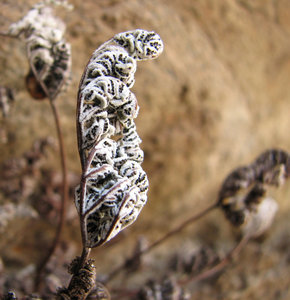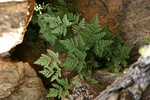Notholaena californica
California Cloakfern
Carl RothfelsIntroduction
This beautiful small fern occurs in northern Mexico (Baja California Norte and Sur, and Sonora) and extreme southwestern US (Arizona and California). It is usually found in cracks in acidic rock cliffs and slopes, often in very dry exposed sites. I recognize two subspecies, based on Windham (1993a): N. californica ssp. californica (Yellow California Cloakfern) and N. californica ssp. leucophylla Windham (White California Cloakfern). These two taxa differ in the color of their farina (light to bright yellow, vs., bright white). This color difference is the result of significant differences in the chemical composition of the farina (Wollenweber, 1984).
The complete evolutionary history within N. californica, however, is complex. Notholaena californica ssp. californica is currently only known as an apogamous pentaploid (the sporophytes have five complete sets of chromosomes rather than the typical two sets, and produce unreduced spores, which develop into pentaploid gametophytes, which then produce a new sporophyte directly from their vegetative tissue, without sexual reproduction), based on a single chromosome count from a population in Arizona (Windham, 1993a). Notholaena californica ssp. leucophylla, on the other hand, has sexual diploid populations, apogamous triploid populations, and possibly tetraploid populations as well (Mickel and Smith, 2004). The relationship among these different populations (both within and between the subspecies) is in need of more study.
Characteristics
Notholaena californica is one of the core Notholaena species with strongly pentagonal leaves. As such it resembles N. standleyi or N. sulphurea, but its leaves are much more divided (almost lacey) than either of those two. Confusion is most likely with N. neglecta, which differs in its leaf shape (more elongate, almost deltate), its rhizome scales (strongly two-toned, with broad brown margins), and its range. Also, N. neglecta does not have a white chemotype; its farina are always yellow.
References
Giauque, M. F. A. 1949. Wax glands and prothallia. American Fern Journal 39:33-35.
Mickel, J. T., and A. R. Smith. 2004. The Pteridophytes of Mexico. The New York Botanical Garden Press, New York.
NatureServe. 2008. NatureServe Explorer, Arlington, Virginia. www.natureserve.org/explorer/
Rothfels, C. J., M. D. Windham, A. L. Grusz, G. J. Gastony, and K. M. Pryer. 2008. Toward a monophyletic Notholaena (Pteridaceae): Resolving patterns of evolutionary convergence in xeric-adapted ferns Taxon 57:712-724.
Tryon, R. M. 1956. A revision of the American species of Notholaena. Contributions from the Gray Herbarium 179:1-106.
Windham, M. D. 1993a. Notholaena. Pages 143--149 in Flora of North America (Flora of North American Editorial Committee, ed.) Oxford University Press, New York.
Windham, M. D., and G. Yatskievych. 2003. Chromosome studies of cheilanthoid ferns (Pteridaceae: Cheilanthoideae) from the western United States and Mexico. American Journal of Botany 90:1788-1800.
Wollenweber, E. 1984. Exudate flavonoids of Mexican ferns as chemotaxonomic markers. Rev. Latinoamer. Quim. 15:3-11.
Title Illustrations

| Scientific Name | Notholaena californica ssp. leucophylla |
|---|---|
| Location | USA, California |
| Comments | Note the farina-covered leaf under surfaces exposed when the leaves roll inwards under water stress. Note also the black marginal sporangia, and the absence of a false indusium. |
| Specimen Condition | Live Specimen |
| Identified By | C.J.Rothfels |
| Image Use |
 This media file is licensed under the Creative Commons Attribution-NonCommercial License - Version 3.0. This media file is licensed under the Creative Commons Attribution-NonCommercial License - Version 3.0.
|
| Copyright |
© 2008 Carl Rothfels

|
| Scientific Name | Notholaena californica ssp. californica |
|---|---|
| Location | USA, Arizona, Black Canyon |
| Acknowledgements | Reproduced, with permission, from Arizona Ferns; azferns.org. |
| Specimen Condition | Live Specimen |
| Identified By | J.Metzgar |
| Life Cycle Stage | sporophyte |
| Image Use |
 This media file is licensed under the Creative Commons Attribution License - Version 3.0. This media file is licensed under the Creative Commons Attribution License - Version 3.0.
|
| Copyright |
© 2005 Jordan Metzgar

|
About This Page
Carl Rothfels

Duke University, Durham, North Carolina, USA
Correspondence regarding this page should be directed to Carl Rothfels at
Page copyright © 2008 Carl Rothfels
 Page: Tree of Life
Notholaena californica . California Cloakfern.
Authored by
Carl Rothfels.
The TEXT of this page is licensed under the
Creative Commons Attribution-NonCommercial License - Version 3.0. Note that images and other media
featured on this page are each governed by their own license, and they may or may not be available
for reuse. Click on an image or a media link to access the media data window, which provides the
relevant licensing information. For the general terms and conditions of ToL material reuse and
redistribution, please see the Tree of Life Copyright
Policies.
Page: Tree of Life
Notholaena californica . California Cloakfern.
Authored by
Carl Rothfels.
The TEXT of this page is licensed under the
Creative Commons Attribution-NonCommercial License - Version 3.0. Note that images and other media
featured on this page are each governed by their own license, and they may or may not be available
for reuse. Click on an image or a media link to access the media data window, which provides the
relevant licensing information. For the general terms and conditions of ToL material reuse and
redistribution, please see the Tree of Life Copyright
Policies.
- First online 23 December 2008
- Content changed 23 December 2008
Citing this page:
Rothfels, Carl. 2008. Notholaena californica . California Cloakfern. Version 23 December 2008 (under construction). http://tolweb.org/Notholaena_californica/133603/2008.12.23 in The Tree of Life Web Project, http://tolweb.org/










 Go to quick links
Go to quick search
Go to navigation for this section of the ToL site
Go to detailed links for the ToL site
Go to quick links
Go to quick search
Go to navigation for this section of the ToL site
Go to detailed links for the ToL site